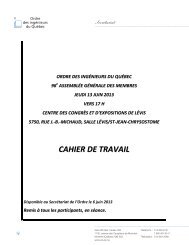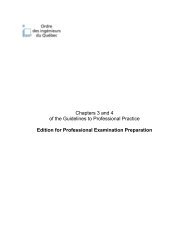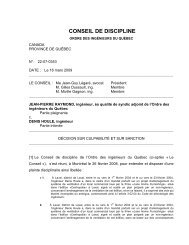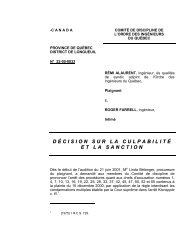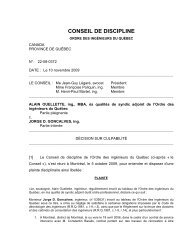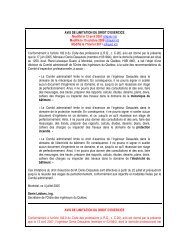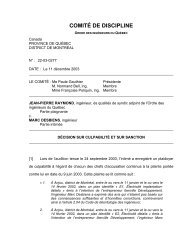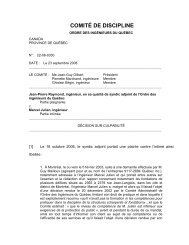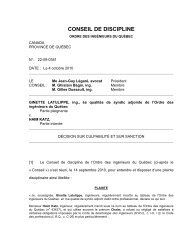22-07-0338 - Ordre des ingénieurs du Québec
22-07-0338 - Ordre des ingénieurs du Québec
22-07-0338 - Ordre des ingénieurs du Québec
Create successful ePaper yourself
Turn your PDF publications into a flip-book with our unique Google optimized e-Paper software.
DOSSIER # <strong>22</strong>-<strong>07</strong>-<strong>0338</strong> PAGE : 10<br />
Si la jurisprudence peut servir de guide au Comité quant à la justesse de sanctions<br />
à imposer, ce dernier ne doit toutefois pas perdre de vue, dans chaque cas, les<br />
circonstances particulières ayant entouré la commission <strong>des</strong> infractions<br />
reprochées.»<br />
[26] La Cour d’appel dans l’affaire Paquette c. Comité de discipline de la Corporation<br />
professionnelle <strong>des</strong> médecins 4 déclarait :<br />
« L’un <strong>des</strong> buts <strong>du</strong> Code de déontologie est précisément de protéger les citoyens<br />
québécois contre les professionnels susceptibles de leur causer préjudice et d’une<br />
façon plus générale de maintenir un standard professionnel de haute qualité à leur<br />
endroit. »<br />
[27] En regard <strong>des</strong> recommandations communes le Tribunal en s’appuyant sur les<br />
propos de l’Honorable Juge Fish (alors à la Cour d’appel) dans l’arrêt Verdi-Douglas c.<br />
R. 5 déclare :<br />
10. La Cour d'appel s'est prononcée très récemment sur l'attitude à adopter<br />
lorsque <strong>des</strong> procureurs, après de sérieuses et intenses négociations,<br />
présentent de façon conjointe au tribunal leurs recommandations quant aux<br />
sanctions à imposer.<br />
11. Après avoir écrit:<br />
39. I think it’s important to emphasize that the joint submission in this case<br />
was the object of lengthy and detailed negotiations over a considerable period<br />
of time by experienced and conscientious counsel on both si<strong>des</strong>, (…) and<br />
clearly contingent on a plea of guilty by the appellant.<br />
La Cour d'appel, sous la plume de l'honorable Juge Fish, fait un tour d'horizon<br />
de la jurisprudence canadienne sur le sujet et conclut:<br />
44. Appellate courts, increasingly in recent years, have stated time and again<br />
that trial judges should not reject jointly proposed sentences unless they are<br />
"unreasonable contrary to the public interest", "unfit", or "would bring the<br />
administration of justice into disrepute".<br />
52. In my view, a reasonable joint submission cannot be said to "bring the<br />
administration of justice into disrepute". An unreasonable joint submission, on<br />
the other hand, is surely "contrary to the public interest".<br />
4 67 Q.A.C. 201<br />
5 J.E.2002 p 249



